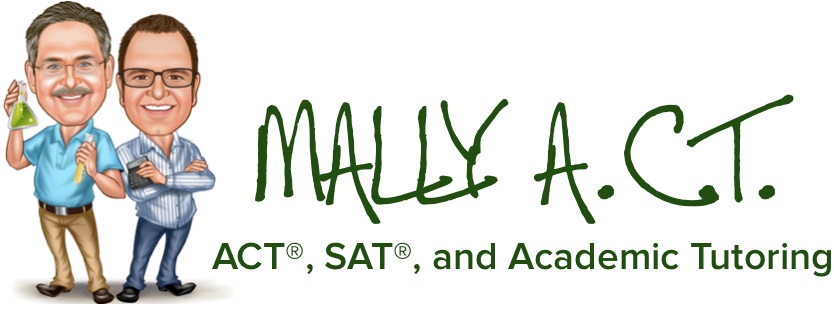"The Truth About the SAT and ACT" - They Matter.
/At Mally A.C.T., we’re always keeping an eye on the current state of the academic and standardized testing landscape because it’s ever-changing, and, quite frankly, it’s fascinating to us.
That might explain why we’re here, eh?
Nevertheless, the Wall Street Journal published an extremely interesting piece today titled “The Truth About the SAT and ACT,” and while you need a subscription to view the article, we’ve taken the liberty of highlighting some key viewpoints, how they relate to what we say at Mally A.C.T., and figured we’d save you the cost of a subscription in the process.
The authors stated very prominently in their article that parents and students cannot undermine the importance of the ACT and SAT when it comes to college admissions.
“The SAT and ACT matter. They help overwhelmed admissions officers divide enormous numbers of applicants into pools for further assessment. High scores don’t guarantee admission anywhere, and low scores don’t rule it out, but schools take the tests seriously,” explained Kuncel and Sackett.
We’ve always said at Mally A.C.T. that admission into colleges comes down to five key areas: GPA, ACT/SAT test scores, extracurricular activities, college essays, and community involvement
The ACT/SAT is the ultimate equalizer – it’s a standardized test on a standardized playing field, so what it can do is help separate students who have a 3.50 GPA due to a vast amount of extra credit opportunities or weighted GPA scales from a student with a 3.50 GPA who legitimately earned it. Most colleges recalculate students’ GPAs anyway, but it still doesn’t entirely take into consideration student workload or the difficulty of a teacher’s curriculum.
Kuncel and Sackett echoed the same sentiment as us when they explained how high school GPAs continue to go up due to grade inflation, which is something we’ve noticed over the years here as well.
As a matter of fact, it’s easy to argue that the ACT/SAT test score is the only one of the five collegiate admission pillars that isn’t up for interpretation or subjectivity – it’s a hard, concrete score. The other areas can perhaps balance out a lower score on standardized tests, but they can only help out so much.
What’s interesting to us about the article is the insight it provides into how college admissions offices look at standardized testing scores and what they look for in their standardized testing scores.
To some, it might just look like a number. Not to admissions offices.
“Standardized tests are just tools –very effective tools—but they provide invaluable information to admissions offices. They identify those students who need help catching up with fundamental skills and those who are ready to tackle advanced material and rapidly accelerate their learning,” stated Kuncel and Sackett.
And, according to Kuncel and Sackett, it’s more than just a number when it comes to job performance in the real world, as well. A big brunt of the ACT and SAT focuses on math and reading, and proficiency in those two areas are related to job performance.
Kuncel and Sackett went on to say, “…these skills are related to effective leadership and creative achievements at work. Being able to read texts and make sense of them and having strong quantitative reasoning are crucial in the modern information economy.”
Again, we want to reiterate that, to us, ACT and SAT scores aren’t the end-all-be-all for college admission, but the authors seem to be making the case that they have major significance. They explain how admission tests aren’t necessarily windows into each individual student’s talent, but they assess the skills that they’ve developed over the years of education while evaluating that student’s ability to read and interpret prose, think critically, how they reason mathematically.
So where do we go from here?
This day and age, with the competitive nature of college admissions, success on the ACT and SAT can give you or your student a leg up on the rest of the pack. If Student A has a similar GPA, similar extracurricular activities and community involvement, and admissions essays that are neck-and-neck with Student B, guess what admissions offices are going to look at next as the deciding factor?
That’s why we have plenty of ACT and SAT tutoring options and academic tutoring options for all types of learners and students with all types of backgrounds – to prepare students for the future, to help make the test more manageable for students.
And to help students get into the colleges of their dreams.


